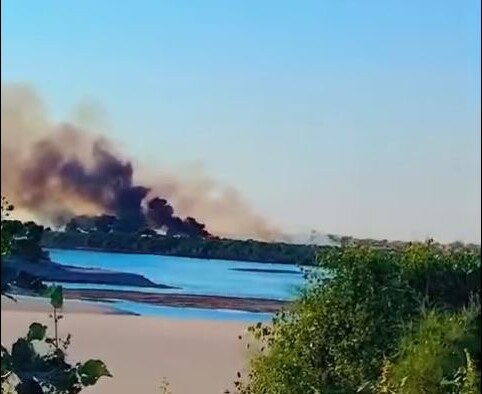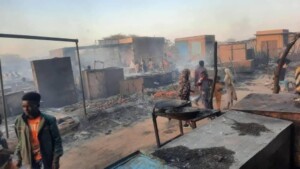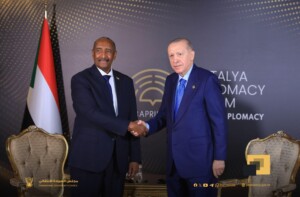Sudan war: Dozens dead amid accusations of sexual violence in El Gezira

Aftermath of a fire in a Kanabi residential area in southern El Gezira (Photo: Supplied)
Nine people were killed in an attack on Abu Gouta, El Gezira, this morning, marking the latest in a series of violent incidents targeting residents of the region. Reports indicate that these attacks have included killings, torture, arbitrary arrests, sexual violence, and human rights abuses.
Jaafar Mohamedein, Secretary-General of the Kanabi* Congress, told Radio Dabanga that the attack targeted multiple Kanabi residential areas, resulting in nine fatalities. He held the Sudanese Armed Forces (SAF), and the Rapid Support Forces (RSF) responsible for the violence.
Yesterday, 18 residents of El Hedeiba and eastern Um El Gura were killed while a camp in El Shakaba in southern El Gezira was reportedly set on fire.
Mohamedein accused the Sudan Shield Forces, led by Abu Agla Keikel, of committing acts of sexual violence, including rape, across several Kanabi areas. He emphasised ongoing efforts to document these crimes, condemning the violations as part of a long-standing pattern of abuse against the Kanabi community.
“These crimes, which include horrific acts such as raping women, killing men, and burning children, constitute a blatant attack on humanity,” he said, urging the SAF, RSF, and international organisations to intervene to protect the Kanabi people.
Adam Rijal, spokesperson for the Coordination of Displaced People and Refugees, accused the SAF and allied militias, including El Baraa Ibn Malik Brigade and the Sudan Shield Forces, of committing systematic retaliatory killings in El Kanabi El Gezira. He told Radio Dabanga that these “heinous and barbaric massacres” specifically targeted children and the elderly “based on their ethnicity and skin colour”.
Torture video
As reported yesterday by Radio Dabanga, graphic video footage was shared on social media allegedly showing SAF troops and militia forces loyal to Abu Agla Keikel torturing a doctor with special needs in Wad Madani.
US envoy to Sudan Tom Perillo expressed concern over reports of “retributions against individuals” from Wad Madani, in a post on X (formerly Twitter) yesterday.
In a statement today, the Sudanese Journalists Syndicate called for transparent trials for those responsible and urged an end to the circulation of graphic videos, cautioning that such material risks fuelling hate speech and exacerbating social divisions. It condemned extrajudicial killings and degrading treatment of civilians, stating that such actions violate human and legal principles.
The humanitarian organisation MASHAD also expressed alarm over the rise of hate speech in Sudan, attributing its growth to irresponsible media practices and social media platforms. In a statement today, It accused some parties (without naming them) of spreading fear and division through misinformation and incitement.
MASHAD called for stricter media oversight and accountability for those promoting hate speech. It urged media outlets to prioritise objectivity and credibility in their reporting to foster peace and stability. The organisation also appealed to the international community to support Sudan in ending the war and addressing these violations.
Minister of Information
In a statement today seen by Dabanga, Sudan’s minister of information and government spokesperson, Khaled El Aiser, appealed to all warring factions to adhere to the principles of justice and respect the rule of law, “especially in handling prisoners and those suspected of collaborating with rebels”. He urged fighters to avoid violations or retaliatory actions following military victories, emphasising the SAF’s commitment to humanitarian values and “fair trials without vengeance”.
El Aiser concurrently criticised groups who “hold double standards,” accusing them of “using isolated incidents” to push divisive rethoric. He added that these groups support rebels and mercenaries, who he said have committed unprecedented crimes against civilians since the conflict began on April 15, 2023.
The minister reaffirmed the government’s rejection of all crimes against the Sudanese people, pledging continued efforts to build a state founded on justice and law despite ongoing challenges.
* Kanabi: Since 1925, when the El Gezira agricultural project was initiated by the British colonial powers, people moved from western parts of the country, including many from Darfur, to El Gezira as seasonal workers. They settled on the outskirts of villages and near irrigation channels and water banks. The settlements were called camps (kanabi).
As the successive El Gezira governments considered them temporary workers, they did not provide many services. Their lives can be characterised by poverty and isolation, due to government policies and to discrimination they face based on ethnicity and culture by the surrounding population.
According to figures presented in 2018 by Jaafar Mohamedein, Secretary General of the Kanabi Congress, the 2,495,000 kanabi living in El Gezira make up 39 per cent of the total population of the state.
Kanabi and other people from the western parts of the country also moved to eastern Sudan, in particular Sennar and El Gedaref, to work at the many farms there.











 and then
and then